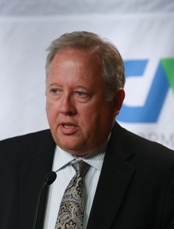
An Americas Agenda for the World
The Inter-American Democratic Charter is a watershed in how the region understands democracy.
This is a period of some uncertainty but also enormous promise for the countries of the hemisphere. Critical presidential and parliamentary elections this year will not only influence domestic agendas, but also set the tone of inter-American relations. Meanwhile, China’s strong and growing presence in Latin America prompts interest in the strategy shaping its decisions. On the economic front, lower oil prices may drive growth for some countries in 2015, but slowing economies in Europe, Japan, and China may offset gains from the dip in oil prices.
These and other topics were discussed at the Nineteenth Annual CAF Conference, on panels regarding elections and political trends in Latin America, the quality of relations between Latin America and Asia, and the development outlook in the current global economic context. On other conference panels, officials and analysts shared their thoughts about the growth and sustainability of the middle class in Latin America. A high-level panel reviewed the geopolitical challenges facing the countries of the hemisphere, while another session featured a discussion on the state of regional integration in Latin America. The aim of this sustained collaboration between CAF – Development Bank of Latin America, the Inter-American Dialogue, and the Organization of American States is to demonstrate the importance of global economic and political relations with Latin America and provide a detailed review of hemispheric economic affairs.
In his introductory remarks, Enrique García, president of CAF - Development Bank of Latin America, argued that Latin America needs a model of growth that is inclusive and sustainable for the environment, which will require political consensus. Luis Almagro, Secretary General of the OAS, noted that creating good policies means translating citizen demands into solutions in a region that is constantly changing and incorporating new challenges, demands, and issues. Finally, Michael Shifter, president of the Inter-American Dialogue, highlighted a new phase in Inter-American relations, signaled by the normalization of diplomatic relations between the United States and Cuba. This, Shifter said, is an opportunity to set the bases for a more intense, institutionalized and prosperous relationship among all countries of the Hemisphere.
Video: Opening Remarks (English), Apertura (Español)
The first panel, moderated by CNN en Español senior anchor Patricia Janiot, focused on the geopolitical challenges facing Latin America. In particular, participants discussed growing bilateral tensions between Venezuela and Colombia, the political and economic situation in Brazil, and citizens’ protests against corruption.
Video: Geopolitical Challenges of the Hemisphere (English), Los desafíos políticos del hemisferio (Español)
Secretary General Almagro described the crisis between Venezuela and Colombia in a regional context, arguing that problems related to migration have been historic. Although the Permanent Council of the OAS decided not to call for a meeting of ministers on this issue, Almagro said that the Commission on Human Rights is an autonomous body, and that the General Secretariat of the OAS has been working on the ground to protect and defend the rights of those affected by this situation. The priority of the OAS, Almagro said, is to ensure that citizens’ rights are protected.
If we fail to heed the frustration and anger that is taking place in this moment, we may convince our citizens that democracy simply cannot deliver.
- Roberta Jacobson, US Assistant Secretary of State
Roberta Jacobson, United States Assistant Secretary of State for Western Hemisphere Affairs, argued that citizens in Latin America are tired of corruption and are protesting in a peaceful, democratic, and legitimate way. She urged the hemisphere to openly discuss the consequences of corruption, which hurts economic growth and perpetuates inequality. Assistant Secretary Jacobson added that the challenge for the hemisphere is to respond to the opportunity provided by citizens, empower them, and be accountable to them to strengthen democracy.
Marco Aurélio Garcia, foreign policy advisor to the president of Brazil, addressed the political and economic situation in his country. He described it as a combination of a fiscal crisis and a political crisis, but noted that institutions, particularly the Judiciary, are working in Brazil, and are addressing corruption charges against public officials and businessmen. Garcia added that citizens protesting across the region is positive for democracy and indicates that new social sectors have entered the political sphere in the last decade.
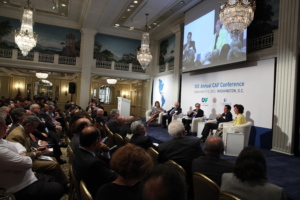 Janiot asked Martín Torrijos, former president of Panama, about the political scenario in Central America, which is also facing unprecedented protests against corruption. Torrijos urged politicians, businessmen, and civil society to forge a new social pact that incorporates transparency, accountability, and institutions that fight corruption and impunity. Torrijos explained that this challenge requires the implementation of fiscal reforms and promoting education as a way to protect the emerging middle clases in Latin America.
Janiot asked Martín Torrijos, former president of Panama, about the political scenario in Central America, which is also facing unprecedented protests against corruption. Torrijos urged politicians, businessmen, and civil society to forge a new social pact that incorporates transparency, accountability, and institutions that fight corruption and impunity. Torrijos explained that this challenge requires the implementation of fiscal reforms and promoting education as a way to protect the emerging middle clases in Latin America.
The second panel of the conference addressed upcoming elections in the region. Michael Shifter, who moderated the discussion, noted that elections are changing the political landscape in the region, as citizens have become disenchanted with their leaders.
Video: Elections & Political Scenarios (English), Elecciones y escenarios políticos (Español)
Alfonso Quiñónez, professor at the Francisco Marroquin University of Guatemala, described the scenario after the first round of presidential elections in this Central American country. Only two days before the vote, Quiñónez explained, the president resigned in the midst of strong protests against corruption. In this context, anti-establishment candidate Jimmy Morales came in first, in an election marked by a high voter turnout and social mobilization against corruption.
Argentina will hold presidential elections on October 25th. Sergio Berensztein, founder and president of Berensztein and Professor at Torcuato de Tella University, noted that for the first time in many years, the elections are competitive, and the result cannot be anticipated. The three main candidates – Governor Daniel Scioli, Mayor Mauricio Macri and Congressman Sergio Massa – seem to agree on what must be done, including reaching an agreement with holders of defaulted public bonds, controlling inflation, and restoring investors’ confidence. These candidates disagree, however, on how to achieve these goals.
Venezuela's elections will have impact Latin America. We are going through a very complex economic crisis, so it's axiomatic: President Maduro is going to be reviewed.
- Vladimir Villegas, Columnist, El Nacional (Venezuela)
Vladimir Villegas, columnist at El Nacional newspaper, discussed the upcoming parliamentary elections in Venezuela, scheduled for December 6. He noted that although the government has lost support according to polls, chavismo has been able to reverse negative situations in the past. He added that what citizens say in polls and what they effectively vote can be very different. The challenge for Maduro, according to Villegas, is to implement much belated changes in economic policy without alienating his political base, while the opposition must prove that it can present a coherent alternative.
Peru will elect a new president in April 2016. Rosa María Palacios, political analyst and journalist at La República newspaper, described her country’s political scenario, in which political parties are extremely weak and legislators frequently switch parties. On the economic front, Palacios explained that Peruvians are feeling pessimistic, as the country has stopped growing at an annual 6 percent rate. This will be an important factor in the campaign, but Palacios said that the next government is likely to maintain the economic model that has been implemented since 1990.
CAF President Enrique García moderated a panel on the development challenges of Latin America in the current global environment. After a decade of sustained economic growth, the region is now facing an economic slowdown. Panelists discussed the implications of this new scenario for Latin American economies and societies.
Video: Latin America's Development Challenges (English), Retos del desarrollo de América Latina (Español)
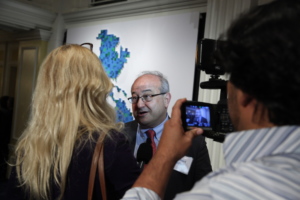 Alejandro Werner, director of Western Hemisphere Department at the International Monetary Fund, said that the challenge is to regain sustainable growth. Even if the region is growing at a 3 percent annual rate, he noted, this is still very impressive in historic terms. This is an opportunity to implement reforms, strengthen integration, and promote openness in order to boost growth and achieve higher standards of living. Werner also noted that the drop in international oil prices is affecting Venezuela, while Brazil faces a fiscal crisis in a very complicated political environment, which has hurt investment.
Alejandro Werner, director of Western Hemisphere Department at the International Monetary Fund, said that the challenge is to regain sustainable growth. Even if the region is growing at a 3 percent annual rate, he noted, this is still very impressive in historic terms. This is an opportunity to implement reforms, strengthen integration, and promote openness in order to boost growth and achieve higher standards of living. Werner also noted that the drop in international oil prices is affecting Venezuela, while Brazil faces a fiscal crisis in a very complicated political environment, which has hurt investment.
Jorge Familiar, vice president for Latin America and the Caribbean at the World Bank, admitted that the economic situation deteriorated faster than expected, and Latin American economies are barely growing. Additionally, social transformations have increased citizens’ demands. Familiar urged governments to prioritize investments in human capital and infrastructure, as well as implement reforms to boost innovation and improve the business environment. He added that the social progress of the last decade has to be protected, as 40 percent of Latin Americans are still in a vulnerable situation, and could return to poverty.
Rebeca Grynspan, secretary general of the Ibero-American General Secretariat, presented a more optimistic perspective. Grynspan argued that there is no generalized crisis in the region, and that Latin America is now much more prepared to face an adverse economic situation than it was in the 1980´s. During the years of economic expansion, Grynspan explained, the region invested in its people: education, social programs, and human capital. The challenge now, she added, is to diversify the economy, which requires implementing reforms with the private sector that will improve productivity and incorporate technology.
There really isn't a generalized crisis like what we saw in the 80's. We have the instruments now to make the necessary adjustments that we didn't have in the past. It's not going to be a pleasant adjustment, and in some case it's going to be painful, but it's doable and it's possible.
- Rebeca Grynspan, Secretary General, Ibero-American General Secretariat
Luis Miguel Castilla, former minister of economy and finance and ambassador of Peru to the United States, described the measures his country took to face the new economic scenario. First, Peru maintained a careful fiscal policy, which led to lower debt levels and foreign reserves that represent a third of total GDP. Second, the government invested in closing the gap in human capital (increasing the education budget) and infrastructure (through public-private partnerships). Finally, Peru reformed its public administration, to make it more efficient and accountable.
José Antonio Ocampo, professor at Columbia University and former minister of finance of Colombia, agreed with the other panelists on the importance of investing in human capital, something that the region has been doing successfully. He explained that the structure of international trade has changed, and the long-term perspectives for Latin America indicate a much lower growth rate. At the same time, he also pointed out that infrastructure remains insufficient, but it is imperative in order to promote regional integration, which has been negatively affected by political divisions and economic protectionism.
To close the panel, João Carlos Ferraz, managing director of the Brazilian Development Bank (BNDES), focused on the situation in his country. He explained that Brazil is facing a structural transition and needs to discuss and negotiate social interests in order to promote the common good. Moving from an era of economic expansion to one of economic consolidation is not only an economic challenge, Ferraz argued, but an ideological and cultural one as well. Regarding the role of the BNDES in this process, he explained that Brazil needs at least 20 years of sustained investment in infrastructure in order to close the current gap.
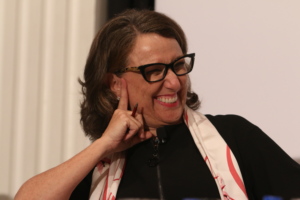 The next panel dealt with the growth of the middle class in Latin America and its future sustainability. Guillermo Perry, professor at the Universidad de los Andes and former minister of finance of Colombia, moderated the discussion.
The next panel dealt with the growth of the middle class in Latin America and its future sustainability. Guillermo Perry, professor at the Universidad de los Andes and former minister of finance of Colombia, moderated the discussion.
Video: The Growth of the Middle Class (English), El crecimiento de la clase media (Español)
Luis-Felipe López-Calva, director of the World Development Report 2017 at the World Bank, described the importance of the middle class as a measure of economic performance. He explained that the middle class is fundamental because its consumption is a drive for economic growth, and because members of the middle class generally oppose political conflict and demand respect for human rights. Although poverty in Latin America has decreased from 45 to 25 percent, López-Calva warned that only 15 percent of these entered the middle class, while the rest remain in a vulnerable situation.
Pablo Sanguinetti, chief economist at CAF – Development Bank of Latin America, argued that development ultimately depends on what people do, more than what countries produce. He noted the importance of emerging entrepreneurs to generate sustained growth, and explained that 1/3 of Latin Americans own their own business, while in the United States the proportion is 1/10. However, Latin American businesses are very small, and most work on a subsistence level.
One in every three people in Latin America manages their own business; in the United States it's one in every ten. The problem is that most of these entrepreneurs manage very small businesses: 90% of these companies don't have employees.
-Pablo Sanguinetti, Chief Economist, CAF - Development Bank of Latin America
The panel also included Santiago Levy, vice president for sectors and knowledge at the Inter-American Development Bank, who highlighted the importance of human capital and productivity. He explained that in the last 25 years there has been an important expansion in education in Latin America, but with little impact on productivity. Without this improvement, he noted, it will be hard to maintain strong and sustainable middle classes.
Nora Lustig, professor at Tulane University and non-resident senior fellow and project director for commitment to equity at the Inter-American Dialogue, focused on the relationship between the growth of the middle class and the improvement of public services. She pointed out that the middle class in Latin America usually resorts to the private sector for public services such as health and education. Lustig added that this emerging social sector will only support more redistributive measures to finance public services if they perceive an improvement in their quality.
Nancy Birdsall, founding president of the Center for Global Development, distinguished between the income secure middle class and the vulnerable middle class, which can return to poverty rapidly if their economic situation worsens. She noted the importance of these two social classes acting together to demand transparency, social protection, and better public services, but this is far from certain. Good governance, Birdsall asserted, requires a fair tax code and low levels of corruption.
The last panelist was Nicola Harrington-Buhay, deputy director of the Development Centre at the Organization for Economic Co-operation and Development (OECD). She noted that Latin America pays fewer taxes than the OECD countries, and relies more on taxing consumption, while OECD members’ tax systems rely on income. She urged the region to reform its labor sectors, adding that 40 percent of businesses cannot find the skilled workers they need.
To conclude the first part of the day, Moisés Naím, distinguished fellow at the Carnegie Endowment for International Peace, interviewed Enrique V. Iglesias, former secretary general of the Ibero-American General Secretariat and former president at the Inter-American Development Bank. The title of their conversation was “Latin America and the World."
Latin America is living a moment of renewed intolerance to corruption.
-Moisés Naím, Distinguished Fellow, Carnegie Endowment
To begin the discussion, Naím described a complex international scenario, characterized by political and economic turbulences, and asked Iglesias about his view of Latin America in this context. Iglesias urged Latin American countries to deepen their integration in order to face international volatility and reduce vulnerability. He also argued that governments need to reach internal consensus in order to face a period of austerity after years of economic expansion. This new era of lower growth, Iglesias explained, can be an opportunity to implement the reforms that Latin America needs in terms of productivity, education, and administrative reform. Finally, he expressed optimism about Latin Americans’ peaceful protests against corruption, which in his opinion will strengthen democracy.
Video: Latin America & the World (English), América Latina y el mundo (Español)
The following panel discussed the situation of regional integration in Latin America. The moderator of the panel was Félix Peña, director of the Institute of International Trade at the ICBC Foundation in Argentina.
Video: Regional Integration (English), Integración regional (Español)
Panelist Eladio Loizaga, minister of foreign affairs of Paraguay, began by explaining that, for Paraguay, the commercial block Mercosur must return to its origins and concentrate on facilitating the movement of goods, developing value chains, and reducing non-tariff protectionist measures. Loizaga praised the integrationist efforts of Chilean president Michelle Bachelet, who has worked to integrate Mercosur with the Pacific Alliance.
Gustavo Fernández, former minister of foreign affairs of Bolivia, analyzed the history of Latin American integration. Fernández noted that the region has learned from its experience and has made great progress in the last decade on the economic and social fronts. Looking ahead, he said that the main challenge is to adapt to a changing international economy where the state is no longer the main organizer of economic activity and corporations determine the international division of labor.
We have had a top-down scheme for regional integration now that is very much centered on signing agreements and treaties. There is too much paperwork and too much red tape; today, we have more than ten institutions for integration throughout Latin America.
- Alejandro Foxley, President, Corporación de Estudios para Latinoamérica
Also on the panel was Alejandro Foxley, president of the Corporación de Estudios para Latinoamérica (CIEPLAN) and former minister of foreign affairs of Chile. He urged Latin America to promote entrepreneurship through bottom-up approaches, articulating local interests with local entrepreneurs. In order to achieve sustained economic growth, Foxley explained, the region will have to diversify its economic matrix and embrace its diversity.
Jacques Rogozinski, director of Nacional Financiera in Mexico, described the Mexican views on regional integration. He noted that NAFTA was highly resisted in Mexico, but now it is a reality and has profoundly affected the Mexican economy. Rogozinski added that an essential step for the Pacific Alliance was the creation of a combined stock market, which allows citizens to buy stocks from the other members of the alliance in their local currency.
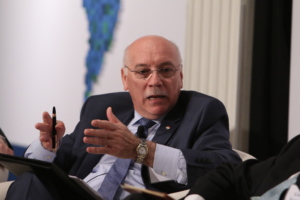 To conclude this panel, Carlos Malamud, senior analyst at the Elcano Royal Institute in Spain, argued that Latin American integration is in crisis, as levels of intra-regional trade are low and bilateral tensions are on the rise. According to Malamud, the three major obstacles for integration are an excess in rhetoric, an excess of nationalism, and a leadership deficit.
To conclude this panel, Carlos Malamud, senior analyst at the Elcano Royal Institute in Spain, argued that Latin American integration is in crisis, as levels of intra-regional trade are low and bilateral tensions are on the rise. According to Malamud, the three major obstacles for integration are an excess in rhetoric, an excess of nationalism, and a leadership deficit.
The next panel addressed relations between Latin America and Asia. Andrea Bernal, anchor at NTN24, moderated the discussion.
Video: Latin America & Asia (English), América Latina y Asia (Español)
Marta Lucía Ramírez, former minister of defense and trade of Colombia, explained that there is no reason to feel “disappointed” about relations between Latin America and Asia because the economic potential is enormous. The region must, however, focus on a long-term strategy to add value to its exports and attract foreign investment. Latin America, Ramírez argued, will have to prepare for a more mature, stable relationship with the emerging Asian economies.
The integration of Latin America has failed. In 2000, I never thought that the relationship with Asia would be conducted in this way, individually.
- Marta Lucía Ramirez, Former Defense and Trade Minister of Colombia
Hiroshi Watanabe, governor and CEO of the Japan Bank for International Cooperation, emphasized that Latin America has become a major source of resources for Asian countries. He noted the importance of integrating the economies of both regions in order to build supply chains, which will require more coordination among countries.
Biliang Hu, director of the Emerging Markets Institute at Beijing Normal University, discussed the importance of the Pacific Alliance and its relations with East Asia. He argued that there are many areas of economic complementarity between both sub-regions, including resources, trade, and infrastructure.
Leonardo Arízaga, vice minister of foreign relations and political integration of Ecuador, described the cooperation projects between his country and China. These agreements, Arizaga argued, will allow Ecuador to refine its oil to reduce imports and expand its generation of hydroelectric power. He noted that China wants to work with all of Latin America and intends to invest USD 250 billion dollars in Latin American infrastructure in the next 10 years and double inter-regional trade.
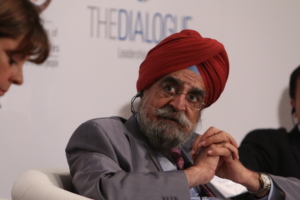 Carlos Casanova, economist for emerging markets at BBVA in Hong Kong, explained that trade between Latin America and Asia expanded at a rate of 8 percent per year between 2008 and 2014, reaching 260 billion dollars. Casanova noted that Latin America will be affected by the recent slowdown of the Chinese economy in three ways: a reduction of demand for their exports of commodities, a decline in international prices of commodities, and fiscal problems for those countries that rely on taxes on exports.
Carlos Casanova, economist for emerging markets at BBVA in Hong Kong, explained that trade between Latin America and Asia expanded at a rate of 8 percent per year between 2008 and 2014, reaching 260 billion dollars. Casanova noted that Latin America will be affected by the recent slowdown of the Chinese economy in three ways: a reduction of demand for their exports of commodities, a decline in international prices of commodities, and fiscal problems for those countries that rely on taxes on exports.
To close the panel, Harinder Kohli, president and CEO of the Centennial Group, discussed the relations between India and Latin America. He explained that most Indian investment is carried out by the private sector, instead of the government, and has focused on East Asia and Africa. However, he urged Latin America to consider the importance of countries like Japan, Korea, and India for partnerships. Kohli noted that foreign direct investment from Asia to Latin America has increased tenfold since 2001, but still represents a small percentage of Asia´s FDI to the world.
The final panel of the conference focused on an issue that has been at the center of the regional agenda: the future of Cuba after the normalization of diplomatic relations with the United States. The discussion was moderated by Mario Bergara, president of the Central Bank of Uruguay and visiting professor at the University of Havana.
Video: New Horizons for Cuba (English), Nuevos horizontes para Cuba (Español)
Juan Triana, professor of the Center for the Study of the Cuban Economy at the University of Havana, explained that 27 percent of the Cuban workforce is now employed outside the government, which reflects the economic transition in the island and will have political, social, and cultural consequences. Triana noted that, in order to take advantage of the opportunity provided with the normalization of relations with the United States and promote development, Cuba must carefully design institutions and strategies.
Alberto Trejos, professor at INCAE Business School in Costa Rica, discussed the growing connection between the evolution of the US-Cuba relationship and the process of internal reform on the island. Trejos noted that ending Cuba’s dual currency will require more transparency in public finances. A major question, he argued, will be whether the lack of political reform will jeopardize economic changes.
Ted Piccone, senior fellow for foreign policy at Brookings Institution, discussed the impact of the Obama administration’s policy change toward Cuba. He asserted that economic reforms in Cuba have been limited and noted that the US trade embargo remains in place. Piccone described the limitations of telecommunications in Cuba, which can hurt the economic prospects of the island, and argued that this is an area in which US companies can be helpful. He also highlighted the potential of new regulations regarding remittances from the United States and travel of US citizens to Cuba.
There is a very clear before and after December 17, but we are in a very long process of normalization. Diplomatic normalization was an important piece of the puzzle, but it was just a piece.
- Dan Restrepo, Former Senior Director, US National Security Council
The panel also included Dan Restrepo, managing director of Restrepo Strategies LLC. He explained that diplomatic normalization is only the first step in a long process of changing interaction between the US and Cuba. Additionally, Restrepo argued that the United States wants to promote stable change on the island, which reflects a shift in its previous strategy towards Cuba. He also noted that issues of democracy and human rights will remain important in the bilateral relationship, which will affect the pace of change of US policy towards Cuba.
The final panelist was Germán Ríos, corporate director of strategic affairs at CAF – Development Bank of Latin America, who discussed the role of multilateral banks in Cuba. He explained that Cuba’s deficiencies in terms of infrastructure must be solved in order to promote economic growth on the island, particularly in roads, energy, and ports. Ríos also described CAF’s role in Cuba, despite the fact that the country is not a member. CAF can help Cuban entrepreneurs particularly by providing financial education, and can contribute to the development of tourism and the biotechnology sector.
The Inter-American Democratic Charter is a watershed in how the region understands democracy.
Summary of the XIV Annual CAF Conference
Regional integration, social inclusion, and the need for a more competitive business climate—discussed at the XVIII Annual CAF Conference
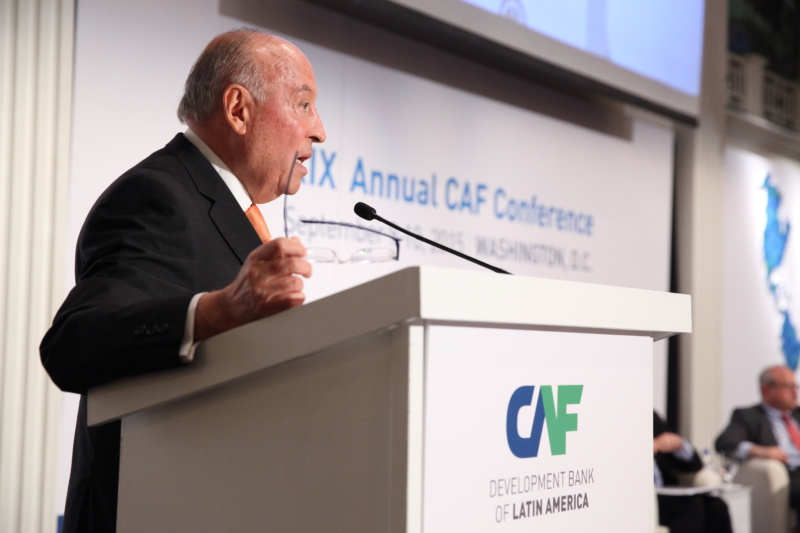
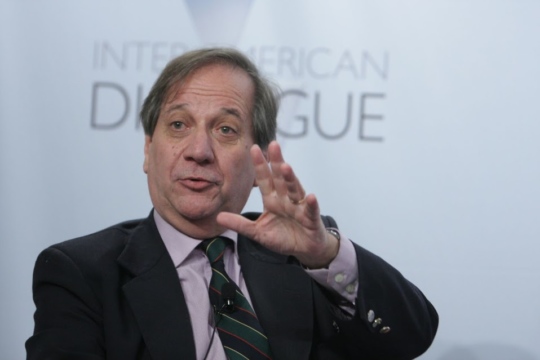
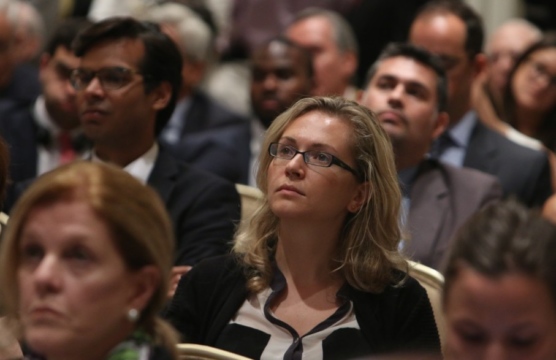 Video
Video